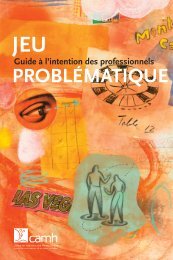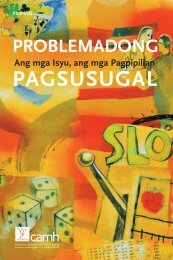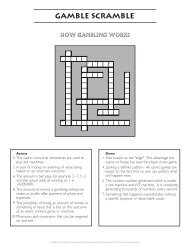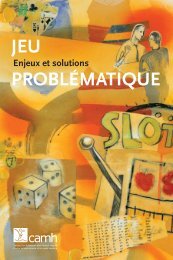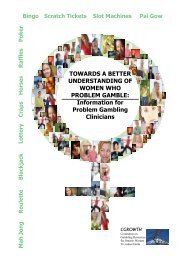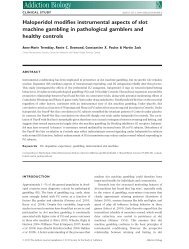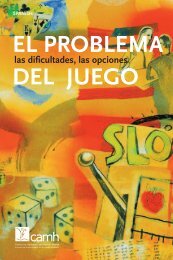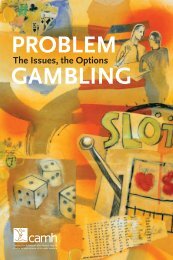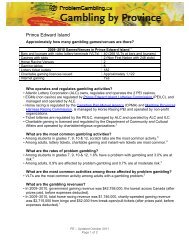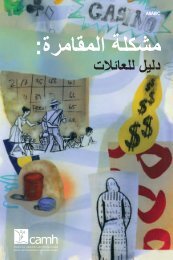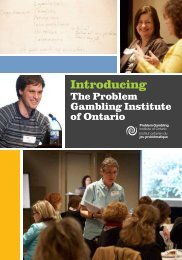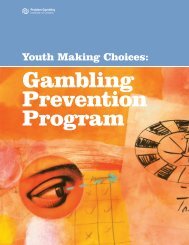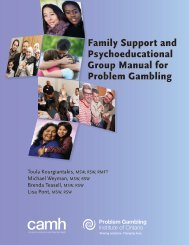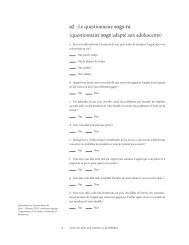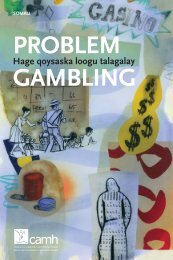Probability, Random Events, and the Mathematics of Gambling
Probability, Random Events, and the Mathematics of Gambling
Probability, Random Events, and the Mathematics of Gambling
You also want an ePaper? Increase the reach of your titles
YUMPU automatically turns print PDFs into web optimized ePapers that Google loves.
<strong>Probability</strong>, <strong>R<strong>and</strong>om</strong> <strong>Events</strong> <strong>and</strong> <strong>the</strong> Ma<strong>the</strong>matics <strong>of</strong> <strong>Gambling</strong><br />
Nigel Turner, Centre for Addiction <strong>and</strong> Mental Health<br />
James Powel, Siemens, Peterborough<br />
<strong>Probability</strong> <strong>the</strong>ory originated in a supremely practical topic—gambling. Every<br />
gambler has an instinctive feeling for “<strong>the</strong> odds.” Gamblers know that <strong>the</strong>re are<br />
regular patterns to chance—although not all <strong>of</strong> <strong>the</strong>ir cherished beliefs survive<br />
ma<strong>the</strong>matical analysis. (Stewart, 1989, p. 44)<br />
Introduction<br />
Anyone who has worked with people who gamble come to realize that <strong>the</strong>y <strong>of</strong>ten have a<br />
number <strong>of</strong> erroneous beliefs <strong>and</strong> attitudes about control, luck, prediction <strong>and</strong> chance. The<br />
main purpose <strong>of</strong> this chapter is to draw a connection between <strong>the</strong> folk beliefs <strong>of</strong> <strong>the</strong> individual<br />
who gambles <strong>and</strong> <strong>the</strong> reality <strong>of</strong> <strong>the</strong> physical world, to illustrate where people make errors <strong>and</strong><br />
to explore <strong>the</strong> origin <strong>of</strong> <strong>the</strong>se errors.<br />
The basic problem is that people who gamble <strong>of</strong>ten believe <strong>the</strong>y can beat <strong>the</strong> odds <strong>and</strong> win.<br />
Even those who know <strong>the</strong> odds still believe <strong>the</strong>y can win. Turner (2000) has argued that much<br />
<strong>of</strong> this is <strong>the</strong> result <strong>of</strong> experience with r<strong>and</strong>om events: r<strong>and</strong>om events fool people into<br />
believing <strong>the</strong>y can predict <strong>the</strong>ir r<strong>and</strong>om outcomes.<br />
Ano<strong>the</strong>r problem is that <strong>the</strong> human mind is predisposed to find patterns <strong>and</strong> does so very<br />
efficiently. For example, natural formations like <strong>the</strong> “face” in <strong>the</strong> Cydonia Mensae region <strong>of</strong><br />
Mars or <strong>the</strong> Sleeping Giant peninsula on <strong>the</strong> shore <strong>of</strong> Lake Superior in Nor<strong>the</strong>rn Ontario,<br />
which have human-like features, are interpreted as images <strong>of</strong> people. In addition, deviations<br />
from expected results, such as winning or losing streaks, are <strong>of</strong>ten perceived as too unlikely to<br />
be a coincidence. As an example <strong>of</strong> our willingness <strong>of</strong> find patterns, a few years ago Eric Von<br />
Daniken (1969) wrote a book in which he claimed to have found evidence for <strong>the</strong> influence <strong>of</strong><br />
extraterrestrial beings on human history. Much <strong>of</strong> his “evidence” was based on such things as<br />
<strong>the</strong> coincidental similarity between a rock drawing in <strong>the</strong> Sahara desert <strong>and</strong> <strong>the</strong> appearance <strong>of</strong><br />
a modern astronaut’s space suit. The book has sold 7 million copies, testifying to <strong>the</strong> ease<br />
with which people can be swayed by <strong>the</strong> argument that patterns cannot be r<strong>and</strong>om<br />
coincidence. Some people believe that “r<strong>and</strong>om” events have no cause <strong>and</strong> are thus<br />
mysterious. As a result, <strong>the</strong>y may believe <strong>the</strong>re is a greater opportunity to influence <strong>the</strong><br />
r<strong>and</strong>om outcome through prayer or similar means. In <strong>the</strong> past, some religions have used dice<br />
2



